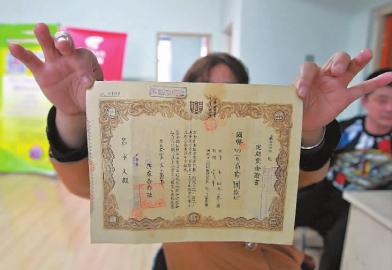When a man's bond is not necessarily his word
By Wang Zhen
2015-04-10
Usually, a bond is a certificate of ownership of a portion of debt to be paid by a government or corporation to the holder with a fixed rate of interest. In the time of war, however, it could be considerably different, more an empty promise than a sure deal, at least that’s what Ms. Guo from the city of Jilin city is finding.
She wants to know about the two brown pieces in her possession, a newspaper in the city of Changchun reported on April 3, quoting her explaining, "They've been around for decades and nobody told me how my great grandpa got them. He simply gave them to my grandpa, then they came to my mom and then me."
Guo's grandfather is a silversmith in Changchun, which was the capital of Manchukuo, Japan's puppet regime in Northeast China (1932-1945), and is well-off.
 |
|
Ms. Guo from the city of Jilin, Jilin province with a Manchuguo bond. [Photo by Wang Qiang/tu.xwh.cn] |
The two pices of paper were issued by a Juitai county co-operative, Xingnong, in 1944, with a face value, interest rate, and duration in Chinese and Japanese, and, Guo wants to know, "The face value is 500 Manchurian dollars, but are they still good?" And that puzzle from Japanese Manchuria seven or eight decades ago, just refuses to go away and won't leave her alone. In 1932, Japan established the puppet state of Machukuo as part of their defense against the encroaching Soviet Union, and was an important source of raw materials and production for resource-starved Japan.
The Great Depression of the 1930s had done catastrophic damage to major industrialized economies worldwide, although Japan suffered less and even had a GDP growing at 5 percent a year, with manufacturing and mining accounting for a large part up until the start of the Pacific War in 1941.
The war gradually dragged the empire into trouble as Japan's heavy industrial sector need to turn nearly all its production over to military needs, while its trade was sharply curtailed as its merchant fleet fell under attack. And, its occupied territories suffered severe as well, so Manchuguo was forced to throw its support behind Japan's military needs.
Xia Xiaodong, of the Imperial Palace of Manchukuo Museum in Changchun, explains, "The most common solution for the Manchuguo government was to issue all sorts of bonds to raise cash for the colonizers. So, what Ms. Guo has is one of the bonds from back then which I have often encountered in my research."
Pi Fusheng, of the Jilin Chinese People's Political Consultative Conference, adds more details, "People living in Manchuguo were forced to buy bonds or put their savings in bank accounts, so Ms. Guo's bonds were something that her great grandpa was compelled to get back then,"then adds that Ms. Guo's 500-Manchuria-dollars worth of bonds were worth quite a lot back in Manchuguo, or about 20,000 - 30,000 yuan ($3,221-$4,832)in today's currency.
Pi then says, "The puppet state disappeared with the surrender of Japan to the Allies, bringing an end to the World War II, and so does the money of any individuals in Manchuguo, including Ms. Guo's great grandpa."
If it's any consolation, the two authorities, in concluding their comments on Ms. Guo's bonds, do say that they have some historical value since they recall a devastating economic situation of the colonizer and the colony.
Xia then adds dourly, "However, the value should not be taken too seriously since the puppet government issued a great many bonds during the war, and there are a lot of them keep in our Palace Museum."




